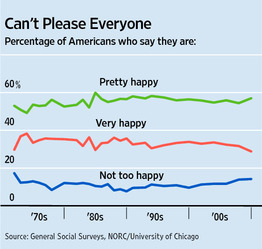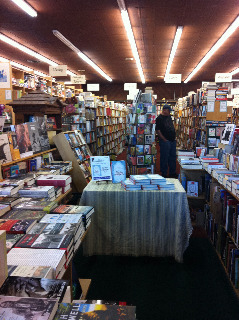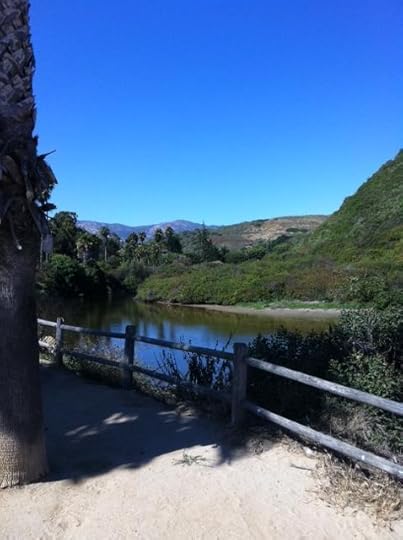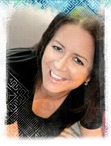Lisa Napoli's Blog, page 40
July 4, 2011
Independence day:
July 4, 2011/Tricycle Daily Dharma/Live Lightly
We have to cultivate contentment with what we have. We really don't need much. When you know this, the mind settles down. Cultivate generosity. Delight in giving. Learn to live lightly. In this way, we can begin to transform what is negative into what is positive. This is how we start to grow up.
-Jetsunma Tenzin Palmo, "No Excuses"








July 3, 2011
@BusinessBhutan and Dzongsar Khyentse Rinpoche: "A #religion that deems other gods as false is not democratic"
Missed this piece in Business Bhutan; worth reading in its entirety, plus clicking to check out the comments, which give you a sense of no matter how reasonable an argument may be, we're not likely ever to come to a consensus on religious practice:
a religion that deems other gods as false is not democratic
Business Bhutan's Dawa T Wangchuk asked Dzongsar Khyentse Rinpoche to share his thoughts on the ruling that independent church constructions with crosses atop will not be allowed in Bhutan
"I have mixed feelings about the ban on Christian graveyards and crucifixes. Now that Bhutan is a new democracy, we have begun talking about all kinds of freedoms and freedom of faith is absolutely fundamental. I don't know, but I think that by banning crosses in public areas we may be violating some fundamental democratic values.
At the same time, we must look at the big picture. Nowadays in the world, especially in so-called "developed" countries throughout Europe and North America, minorities are stirring up trouble by indignantly protecting and promoting their identity, customs and religious practices. Are we prepared for that?
Because I am a religious figure, many people ask me about my thoughts on other religions recruiting for their faith. My answer is this: If the seeker is really finding this belief system, whatever it may be, to be the answer to their spiritual needs, then of course, by all means, let them pursue it. But it goes both ways. Members of the Abrahamic religions—Christians, Jews and even Muslims—are themselves converting to Buddhism. This is absolutely an individual's right. The difference is that these individuals were never lured to Buddhism with anything except dharma itself.
It is the methods of conversion that should be watched. I hear that some people have been persuaded to convert by means of favors, aid, offers of free education and sometimes even cash. Again, the individual has the right to do whatever he or she wants. In fact, I feel that prostitution should be legalized. I understand that these ideas are quite liberal but if somebody wants to willingly sell their body why not? If that's the way she or he wants to live, so be it. But there should be some awareness of the consequences.
My question is: what is more important, the mind or the body? The mind is obviously supremely important, especially since spiritual matters have to do with the mind. What I don't like is when people trade this most precious thing for a few hundred thousand ngultrum or some favors. That is not a wise thing to do. You don't want to love someone because they give you money, such kind of love is shallow. It's the same thing. It is sad to trade your soul just because you are getting some material assistance. I personally know some Tibetans who have supposedly converted to Christianity, but only for the sake of financial aid. Deep inside they continue to practice Buddhism. They put a crucifix in front of the Buddha and when the missionaries come they hide the Buddha. It's a strange hypocritical con game to be playing.
As a religious person and a Buddhist I have been challenged: What are you lamas doing, look at the Christian missionaries, they are giving money to the poor, building hospitals, providing education, giving relief…yet all you lamas do is take money and do pujas. Absolutely right! I agree totally. And there is a lot of corruption. But at least you can't say "I want to become Buddhist because the lamas give money." That is not a spiritual quest. You might as well go to Bill Gates for that.
So it's not right to trade your spirit for material gain. It is also interesting for the newly democratic Bhutanese to notice that Christianity is a monotheistic religion. A monotheistic religion believes in one god. All the others are deemed false. Now that, to me, does not sound democratic.
From the practice point of view, there is an important difference between Buddhists and Christians. Christian doctrine reads that all human beings are sinners and that god is here to save them. We Buddhists believe that we are all Buddhas; we just have to recognize this fact. So there is a fundamental difference in view, and this difference affects the culture and the people in a profound way. It is not only philosophical; much of our culture and values are rooted to this view. As a Buddhist, no matter what, no matter how much I may loathe you, fundamentally I have to acknowledge that you have Buddha nature.
Also bear in mind that Abrahamic religions have a long history of war, especially in the name of faith. One could confidently say that. In fact, the bloodshed caused by these religions adds up to more than the two World Wars combined. Buddhists may be accused of not building hospitals but at least they have 2,500 years of peace to boast about. At least there have been no crusades and bloody missions in the name of Buddhism.
But does that mean we should feel threatened by someone else's faith? I don't know. Then again, how wise it is to allow a few minorities to upset the harmony and the order of the majority? This is something that we have to think about. We have to bear in mind the whole point of democracy is to make the majority of the people happy. All this needs to be contemplated. So this is why to your question I say that I have mixed feelings."








Pursuit of Happiness Gets More Difficult
From the WSJ, this story claims that just 29% of Americans say they're "very happy." (Thanks, Aldis!)

Excerpt:
"The Declaration of Independence enshrined the pursuit of happiness as an inalienable right. Lately, that pursuit appears to have gotten more difficult. The General Social Survey, out of the University of Chicago, polls U.S. residents on everything from how often they attend church to how much they trust one another. In the latest poll, the number of people who said they were "very happy" fell to 29% last year. That is down from 32% in 2006, the year before the recession started, and the lowest level the survey has registered in its 39-year history."








July 2, 2011
@KCRW Good #Food with @EvanKleiman looks at #Bhutan's cuisine
Apparently today Evan Kleiman's delectable food show Good Food repeated an interview with me from two years ago about Bhutanese cuisine…Gosh, I hope I didn't say anything too dumb. …Thanks KCRW (and to Sarah Spitz for the tip-off.)








A new Catholic immersed in Buddhism
http://akseac.wordpress.com/2011/06/27/a-new-catholic-immersed-in-buddhism/
(I still personally find that Buddhism resonates for me more than Catholicism, but I was grateful for this writer's perspective.)








July 1, 2011
From the land of the thunder dragon: Textile Arts of Bhutan
Finally found a copy of this wonderful book edited by Diana Myers and Susan Bean and with writing by the important, late Michael Aris; it's about way more than just textiles, but about life in Bhutan and history, too. It's for the collection I'm amassing of Bhutan printed matter (which I intend to donate some day in the not too distant future to a place TBD.) Nope, I didn't pay $170 for this book….that's why it's taken me so long to find a less expensive, used one.








That which we call "I"
"That which we call "I" is just impermanent, ownerless karma rolling along. Don't take it personally."
-Lama Surya Das, "Surya Says"
(Thanks, Tricycle Daily Dharma!)








June 30, 2011
Adventures in #bookselling: What this first-time #author learned on #book tour
My dear agent Dan Conaway pointed out to me yesterday that it's been 5 months since my book Radio Shangri-La was published. I've been too busy running around the country selling it–figuratively, thankfully, not literally—to notice how much time's gone by. Last night a lush, gorgeous bookstore in lush, gorgeous Santa Barbara called Chaucer's hosted me; it's been around for 37 years, outliving the Borders and Barnes and Nobles in the more pedestrian-trafficked heart of downtown. 
In Radio Shangri-La I revealed what I learned in the "happiest" Kingdom on earth. Now, if you want to hear it, I'm going to share with you a tiny bit of what I learned on book tour: A lot.
First of all, let me say that besides having the privilege of writing a book and getting paid to do so (which was an incredible thrill I don't take for granted or feel entitled to have experienced) I was very fortunate to be able to spend five months doing little else besides touting my book (and engaging in my new passion, volunteering.) Most authors don't have the means or the time to do that. While the publisher paid me an extremely generous advance, when it came time to sell the book, they didn't want to support a tour—which is of course the case for many first-time authors, and increasingly, for well-known ones. Digital means and conventional media are seen as better tools for wider promotion. A "web tour," where a third party is hired by the publisher and myriad blogs are approached with advance copies in exchange for the promise of a review, is more standard these days. Don't get me wrong: it was a great thing, those free book giveaways that happened just as the book hit, to generate buzz.
But as a veteran journalist who's always had a fascination with marketing and promotion, I knew that an author couldn't rely on a Web tour and Facebook alone. There are a lot of great books out there, a lot of things competing for people's attention. I'd given up my "plaform" as a reporter at Marketplace, not that that would have necessarily helped me sell a lot of books, but it did put my name out there every day. I wasn't kidding myself, though: Just having my the achievement of having sold, written and published a book, and it being out in the ether, didn't mean a thing. I needed to sell, sell, sell. (I also knew I wanted to sell through the proper channels, so that the sales of the books counted in the greater scheme of things for booksellers, so not once have I sold a book from my own personal stash and pocketed the money.)
So, for five months, I've been plotting and strategizing: Where do I have friends and family to visit, to rally out their friends to a bookstore? When I go to a bookstore, what media are logical to hit up for an interview? (Again, I've got an advantage—given my job in public radio, and given that my book was about starting a radio station in the Kingdom of Bhutan, I had a bit of a calling card with local stations. But local shows are eager for good guests, regardless.) In my old haunt of North Carolina, for instance, an appearance on Frank Stasio's show on WUNC turned out over 70 people that night to Quail Ridge Books in Raleigh. The bookseller was astonished as more chairs had to be hauled out, and so was I, since I knew hardly any of the people who showed up. (My base was located in Greensboro, an hour or so away, where there was no longer an indy bookstore.)
Same thing in Miami, where I'd been lucky to get into Books and Books in Coral Gables, after my publisher got me invited as a late-minute add to the Ft. Lauderdale Literary Feast. The fantastic Books and Books mailing list, as well as a mention in the paper's book section (which I'd been fortunate to coral after researching the proper contacts) and a brief radio hit (thanks to a former colleague) yielded a packed house, almost entirely of strangers.
Now, not every stop has been jammed. Driving around the midwest with my boyfriend (who, thankfully, understands the book business very well himself and has been a tremendous help) before the Printer's Row Festival in Chicago a month or so ago, we stopped to visit friends in St. Louis, where I'd booked myself into Left Bank Books. There, I didn't get any radio media, just listings courtesy the book store's usual mailings. (Which by the way is a very powerful tool that gets your book out in front of people who might not otherwise have heard of it–and thus, another reason to go to bookstores.) Only 2 people showed up, but that gave me an amazing opportunity to speak long and intently to two very interested, interesting people who I know will forever more be ambassadors for me and the book.
In my native NY at the Rubin Museum, where we launched the book in conversation with dear Simon Winchester, and in my newer hometown of LA at the Track 16 gallery, where my friend Meghan Daum interview me, we had packed houses–thanks to media hits in conjunction with large friend lists, and the lists of those two generous venues. It took a lot of planning and wrangling to pull those things off, but they were worth it.
Then, there are the libraries. Conventional wisdom is that people who go to library events may not buy books. But even in Glendale, CA at the public library, or the other night in Oceanside, CA, I wasn't so worried about book sales. (Though in each place, a qualified bookseller was present.) I was A. happy to be helping support a library, B. happy for the work the library had done in promoting my appearance, and C. thrilled to talk to people who were interested in my book. I am sure that in each place I've gone, one person has gone home and told someone else, at least one other person, about Bhutan and my book.
And the book clubs and ladies lunches! One random chat with someone in a cafe in Santa Monica (I'd just received my book and gave it to a friend for her 50th birthday, and the ladies next to us asked what it was….) led to an appearance at a bookstore I didn't even know about in my area, a beautiful shop in Manhattan Beach called Pages, and their enthusiasm led a local book club to choose Radio Shangri-La and invite me to come speak to them about it. That's not to mention the SKYPE interviews I've started to do with book clubs as a result of the aforementioned Web tour and giveaway.
Book festivals have been interesting, too. Thanks to a long-ago friend who'd landed in Tucson, I got connected to a "mafia" of people involved with the growing Tucson Festival of Books, and invited not only to speak there, but also to a private Women's Foundation event. And I was lucky enough to cross paths with a passionate bookseller named Terry Gilman of the southern California based Mysterious Galaxy, who'd been given the galley of my book early on–and who has gone out of her way to help me promote my book despite the fact that it's not anything close to the genre she typically sells.
Then, of course, there's the Web. I used to cover technology and while I'm not born of the "Web generation," I'm a digital native. So I knew the importance of creating a blog (where I post with information about Bhutan, happiness economics and matters relating the book,) and linking it to Facebook and Twitter.
Okay, so: Is my book a major bestseller knockin' it off the charts? No, maybe it will become one when we all work hard to launch it in paperback next year…..but here's why I know it's a success right now: Every single day, I get incredible mail from people around the world who are reading it, and loving it, an author's dream come true. Every day, people sign up for my Twitter or blog, which means they're likely visiting my website. At Chaucer's last night, I know I made friends not just with Eric Love, the events coordinator, but with the people who turned out. Eric's hopefully going to do what the kind people at E. Shaver's in Savannah did—sell a signed copy of Radio Shangri-La to some regular customer, or a tourist, who needs a present. That person, I'm hoping, will love my book, and spread the word.
And if there's any one takeaway here for authors who are reading this, it's that in this year, 2011, writing a book isn't just about writing a book. It's about selling your book–and there's no one like you to do it. (Although it is hardly a solo pursuit: you need to enlist a small army of supporters every step of the way.) I've loved every single crazy often exhausting minute of the last five months, the people I've met, the old friends and colleagues who've showed up along the way, visiting bookstores and libraries and luncheons in beautiful communities filled with people who love books, love reading, love learning.
I've loved it so much that my dear agent and I are working hard now (after spending quite a long time working on the proposal) to sell another book. Writing it will be one challenge, and then I look forward to, once it's done, getting out there and selling it. With the help of that army of people, including you, who've helped me this time around.








#Radio makes you happier than #TV
Public radio fanatics, listen up (although you already knew this:) A new study shows listening to the radio makes you happier than watching TV. (My professional experience validates these findings, too, in a big way.) 
"The report said: 'Radio is chosen as a lifestyle support system, to help people feel better as they go about their daily lives. Rather than the peaks and troughs that people have claimed to experience with TV and the internet, radio provides a consistent environment themed and shaped to suit the listener's needs at any given time of day, and one that is generally upbeat in tone.'
Except wait, when you read the fine print, it appears that it's the Radio Advertising Bureau who commissioned the study! How bogus. I personally know that tuning out of mainstream media makes you happiest….






















